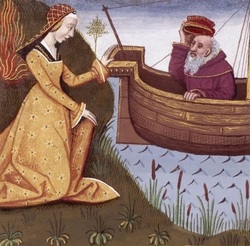HYPSIPYLE

Hypsipyle and her father, medieval miniature.
John Bell
Bell's New Pantheon (1790)
HYPSIPYLE, daughter of Thoas, king of Lemnos, saved her father's life, when the women made a general massacre of the men in that island. Hypsipyle concealed him with great care, sent him into Pontus, and pretended she had killed him ; upon which the women chose her for their queen. Some time after the Argonauts landed in that island, and refreshed themselves in the arms of these widows, Hypsipyle chusing their chief for her companion, by whom she had the twin-brothers, Thous (so called after his grandfather) and Euneus, who commanded the Lemnians at the siege of Troy; but Jason abandoned her, and continued his voyage. After his departure, the Lemnians, discovering that Hypsipyle had spared her father, drove her from their island, on which she retired to Peloponnesus. It was here that she nursed Archemorus, son of Lycurgus, whose dominions lay in the way by which the army of Adrastus passed to the war of Thebes; and where, whilst she directed the Grecian leaders to a spring of fresh water, the young Archemorus was killed by a serpent. We are told by Apollodorus, that the Lemnian women resolved on this slaughter, not from hatred to the men, but for the preference given to their Thracian slaves, occasioned by the foetid exsudations with which Venus had punished the females of Lemnos; either from their neglect of sacrifices, or else because she had taken an aversion to that island from having been surprised in it with Mars. Others assert that Medea, being jealous of Hypsipyle, cast certain drugs into the isle of Lemnos, which produced the disagreeable effect on the ladies. It is added, that during several ages this smell continued on a certain day of the year, to such a degree, that neither their husbands nor children could approach them. In some verses of Statius, Hypsipyle represents the dismal condition of the Lemnians during the interregnum of love.
Source: John Bell, Bell's New Pantheon; or, Historical Dictionary of the Gods, Demi-Gods, Heroes, and Fabulous Personages of Antiquity, vol. 1 (London: British Library, 1790).
Photo credit: Wikimedia Commons.



